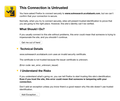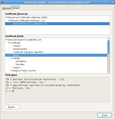
Spammed by "This connection is untrusted" Messages
Firefox 38 is blocking several https websites, including Goggle, with messages that read: "This Connection is Untrusted." The error message appears even after an "exception" is added to specific https websites like Google.
In Preferences > Advanced I have this option selected: When a server requests my personal certificate: select one automatically." Also, I have had the following option check-marked and uncheck-marked without it making any difference: "Query OCSP responder servers to confirm the current validity of certificates."
The following Mozilla Support page for this issue does not help to solve this problem. https://support.mozilla.org/en-US/kb/connection-untrusted-error-message
I've included two screenshots of the errors that are commonly appearing in FIrefox 38 in my experience.
It's important to note that I have previously visited the https websites without a problem that are now being blocked by Firefox 38. Thanks for any tips on how to stop Firefox 38 from blocking safe https websites like Google on a regular basis.
Alle antwurden (3)
hello, the error message will be shown for a reason.
in order to investigate further, please attempt to add an exception on the bottom of the error page in order to inspect the certificate like it is shown on the screenshot attached:
- which issuer information does the certificate contain?
please report back with those piece of information. thank you!
Thanks for the information, philipp.
The error message only appears on occasion and not every time I visit a suspect https website. Next time the error message appears, I will note the issuer information as you have suggested and forward the details at that time. It should be within the next week or so.
You should never add a permanent exception when you visit a website, but instead investigate what is wrong and possibly ask advice elsewhere. Especially a website like Google shouldn't cause such certificate issues.
Do a malware check with several malware scanning programs on the Windows computer. Please scan with all programs because each program detects different malware. All these programs have free versions.
Make sure that you update each program to get the latest version of their databases before doing a scan.
- Malwarebytes' Anti-Malware:
http://www.malwarebytes.org/mbam.php - AdwCleaner:
http://www.bleepingcomputer.com/download/adwcleaner/
http://www.softpedia.com/get/Antivirus/Removal-Tools/AdwCleaner.shtml - SuperAntispyware:
http://www.superantispyware.com/ - Microsoft Safety Scanner:
http://www.microsoft.com/security/scanner/en-us/default.aspx - Windows Defender:
http://windows.microsoft.com/en-us/windows/using-defender - Spybot Search & Destroy:
http://www.safer-networking.org/en/index.html - Kasperky Free Security Scan:
http://www.kaspersky.com/security-scan
You can also do a check for a rootkit infection with TDSSKiller.
- Anti-rootkit utility TDSSKiller:
http://support.kaspersky.com/5350?el=88446
See also:
Bewurke troch cor-el op




